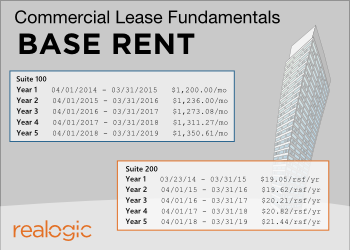 Today’s post is the 5th in the Commercial Lease Fundamentals series and the first article concerning the second of the Four Components of a Lease, namely Rent.
Today’s post is the 5th in the Commercial Lease Fundamentals series and the first article concerning the second of the Four Components of a Lease, namely Rent.
The minimum amount of Rent to be paid (typically referred to as “Base Rent” or “Minimum Rent”) may be stated in a variety of ways:
Base Rent Amount Types
- Annually
- Monthly
- Per Square Foot Per Year
- Per Square Foot Per month
While Base Rent may be fixed for the term, this is rare in commercial real estate leases other than rooftop leases (think things like Antennas), storage leases or occasionally in industrial or warehouse Leases. In office and retail leases, base rent usually increases from year to year.
For typical office and retail leases, Base Rent or Minimum Rent is increased one of three ways:
Base Rent LLCrease Types
- Pursuant to stated amounts for stated time periods in the lease
- based on a formula (i.e. 3% annual rent steps) or
- by an index (i.e. CPI or Porter’s Wage)
It is important to carefully read all lease documents to determine when rent steps will occur, especially if the term does not begin on the first day of a month.
Often times, a lease will spell out the exact monthly payments due in a rent schedule…but not always. When I need to calculate rent increases (sometimes known as rent steps), I turn to a Base Rent Calculator. A Base Rent Calculator can be a simple excel workbook (see the xlsx file attached to this blog post) or a fancy rent wizard that exists inside your accounting system or your lease adminstration system, if you have one.
Abatements
In certain instances, landlords will grant an abatement of rent or a rent credit. Abatements are periods of time when a tenant’s responsibility to pay rent are suspended, usually at the beginning of the lease term. Abatements can be granted either as compensation for a tenant being unable to use the space due to the completion of improvements/build-out or sometimes abatements are simply a financial incentive to backload the deal.
If a lease includes an abatement, it is crucial to determine what exactly is scheduled to be abated (Base Rent only or Base Rent and Additional Rent) as well as the applicable abatement period. Also, in the event of a tenant default, abatements long since passed are sometimes considered repayable so be sure to read any default language in a lease to check for how those events may affect abatements.
In the next blog post, I’ll explain how commercial real estate leases define additional rent and the variables at play with those expenses.